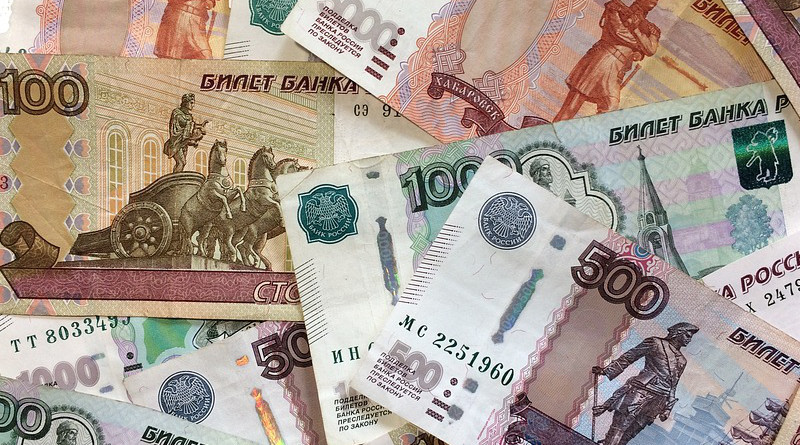How Russia Can Avert Sovereign Default And Why It Might Not Care
By EurActiv
By János Ammann
(EurActiv) — The Russian government has enough funds to prevent a default on its sovereign debt. However, it is unclear whether Moscow has much interest in preventing a default and creditors may have a hard time getting at Russian assets to compensate for their loss.
On 4 April, the Russian government failed to pay back debts and interest payments with a total value of more than $600 million, raising worries that it might default on its debt.
While Russia was allowed to pay earlier debt commitments from the central bank’s international reserves, even though those are supposed to be frozen due to international sanctions, the US Treasury did not allow the reserves to be used for debt repayment anymore.
Moscow has until 4 May to pay out the money. After this grace period, Russia would be considered to be in default on its debt.
Preventing a default
Notwithstanding the sanctions, there are means by which Russia can avert default. For example, it could use its substantial foreign exchange revenues from gas and oil sales to pay back its debt.
“If the Russian government wanted to pay, it could just tell [its gas buyers] to divert some of the money towards servicing the debt,” professor of international economics Ugo Panizza told EURACTIV.
According to Bloomberg, Russia could earn more than $300 billion from energy exports this year.
Another way for Russia to avert a default would be to simply buy back the outstanding bonds, the prices of which have tumbled in recent months as many investors shunned the country’s sovereign debt after Russia’s invasion of Ukraine.
“Given the low price of the bonds, Russia might try to buy back all or most of the bonds,” law professor Mitu Gulati told EURACTIV. “This might be a brilliant strategy,” the sovereign debt expert added, saying that this would prevent a default.
At the end of March, the Russian ministry of finance bought back 72% of the bond that was due on 4 April. It did so in Russian roubles instead of dollars, mainly to prevent local investors from suffering negative consequences.
However, the prices of Russian government bonds have recovered substantially from their initial fall after the start of the invasion, making the option of buying back all the outstanding debt less affordable than before.
Going to court
If Russia defaults on its debt on 4 May, “holders of 25% of the bonds can decide to declare an ‘event of default’ to accelerate the payout of the entire sum of the bonds,” said Lee Buchheit, a long-time law professional with a focus on sovereign debt management.
“This could generate a chain reaction, as one acceleration can trigger the next acceleration,” he told EURACTIV. In theory, this means that Russia would have to pay back its debt earlier than planned.
As Russia probably would not accept such a decision, creditors would have to go to court. If, for example, a British court decides that it has jurisdiction, it can order Russia to pay out its debt. As the government in all likelihood also would not respect a court order, creditors could try to seize assets of the Russian state as a means of debt payment.
“However, it is unlikely that the creditors could get at the frozen assets,” Buchheit said.
What about seizing the energy payments?
Creditors could also try to seize payments made for Russian energy exports, for example the money paid by German gas buyers to Gazprom.
“The question is whether Gazprom would be viewed as the ‘alter ego’ of the Russian state,” Buchheit explained. The Russian government holds a majority stake in the company, but it is not officially a part of the Russian government.
In this hypothetical case of creditors going after German payments to Gazprom, they would have to convince a German court to consider Gazprom as basically equivalent to the Russian state for it to order German gas procurers to pay the creditors instead of Gazprom.
According to Buchheit, this possibility of going after Russian assets might be taken up by some activist investors.
“Ukraine has a lot of support in the financial community. And there might be some bondholders who want to do something for the cause,” he said.
Which reputation?
However, this process would take a lot of money and time, which is why there is not much to fear for Russia in the short term from this front, or from the sovereign default in general.
“Unlike other defaults, I don’t think it would have a big effect on Russia,” Ugo Panizza told EURACTIV. According to him, creditors know that a default would not be linked to the country’s inability to pay, but to political reasons.
Moreover, the Russian government has a low level of government debt and still has access to foreign exchange thanks to its energy exports.
At the end of the day, the biggest risk for Russia is reputation. Usually, sovereign defaults lead to a significant reputational damage that make borrowing more expensive in the future.
“But Putin might not care about the risks of a default,” Mitu Gulati said. “How much reputation does Russia have left to lose?” he asked rhetorically.

